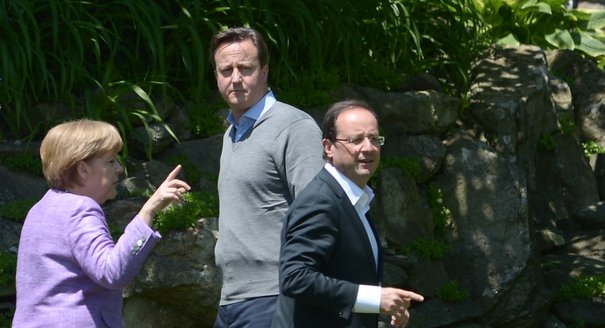Could Europe’s credibility as a serious global player in trade and foreign policy sink any lower?
Consider what happened this week to Karel De Gucht, the EU’s trade commissioner, who normally carries immense authority, and Catherine Ashton, the EU’s foreign policy chief, whose influence is beholden to the member states.
Both have had their standing undermined by Europe’s capitals as governments are determined to pursue their own national interests. In doing so, Europe’s leaders have confirmed the absence of any strategic direction. That applies both to trade relations with China and to crisis management in Syria.
De Gucht’s authority was punctured when German Chancellor Angela Merkel publicly opposed punitive tariffs on solar panels exported by China to European markets. Forget that the solar industry in Germany supports such tariffs because cheap Chinese imports are undermining the sector.
Merkel, who faces reelection this September, went for the bigger goal: the protection of German industry’s interests in China. In effect, she caved in to China’s threats of retaliation against any such punitive tariffs. Merkel feared that Germany, China’s biggest trade partner, would be hit particularly hard.
Indeed, China played a skillful hand during Premier Li Keqiang’s visit to Berlin earlier this week. He praised the excellent state of relations between Berlin and Beijing and made it clear that China would fight tooth and nail to prevent duties from being imposed.
And, because Germany and other big EU member states want to protect their market share in the world’s biggest economy, especially during Europe’s economic downturn, they proved easy prey to Beijing’s old tactics of divide and rule.
That served a nasty blow not only to De Gucht but also to what used to be one of Europe’s strongest cards in the global trade context: a united stance based on a strong belief in fair competition and transparent rules.
In another case of eroded credibility, Europe’s disunity over arms exports to Syria’s rebels has also sorely damaged the EU. This week, Ashton was unable to persuade the UK and France to prolong the arms embargo against Syria. Other sanctions, however, will continue.
It is worth reading the conclusions of last Tuesday’s meeting of EU foreign ministers to get a sense of the muddled but also disingenuous policies pursued by EU countries.
The conclusions also show how the member states still wield enormous power, even though the Lisbon Treaty was supposed to strengthen the position of high representative for foreign affairs and security policy. The member states are simply not interested in handing over their prerogatives.
Above all, London and Paris’s cajoling of the other member states exposed a fundamental flaw inside the EU in the aftermath of the Arab Spring. It is the failure to acknowledge the shortcomings of the 2011 military intervention in Libya, which was led by Britain and France.
After NATO ousted Colonel Muammar Qaddafi in April 2011, the alliance washed its hands of the country. NATO, Britain, France, and the EU did not address key questions following the intervention: how to demilitarize the rebel groups; how to secure Libya’s borders; how to restore the authority of the central institutions. The use of force was not coupled with a long-term follow-up strategy.
A Syrian campaign would need a much bigger military commitment than Libya. But the UK and France have also been reluctant to push for it—and not just because of the mess left behind in Libya.
Leaving aside Russia and China’s opposition to a no-fly zone, Britain and France realize that the use of force is terribly costly if it is not backed up by a coherent exit strategy. Just look at the lessons to be learned from Iraq and Afghanistan, as well as Libya.
So ending the Syrian arms embargo is an attempt by the UK and France to have it both ways: to show that they are on “the right side” while not bearing the risks and costs of a major military campaign. At the same time, they could conveniently demonstrate that their voice has particular weight in the EU when it comes to defense and security matters.
Sending more weapons into Syria is dangerous, even if they go to politically moderate factions within the rebel forces, rather than radical Islamists. Most probably, providing arms will just prolong a civil war that has already cost so many lives and livelihoods.
As for Ashton, her authority was too weak to galvanize opposition to London and Paris. As for Berlin, it was powerless to wield any influence. Germany still carries the stigma of having abstained during the UN Security Council vote to impose a no-fly zone over Libya.
The China trade dispute and the Syrian war confirm once again—and depressingly—that, when it comes to crises, the Europeans do not see the merits of pulling together. They go their own way in spite of knowing that only together do they possess a convincing voice. Europe is losing it.






.jpg)